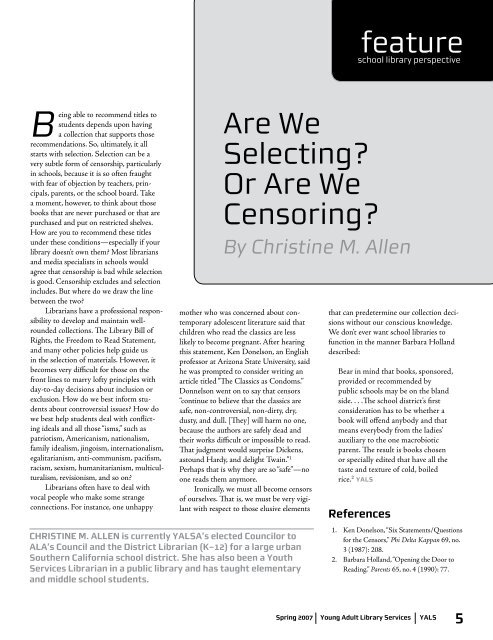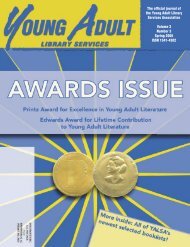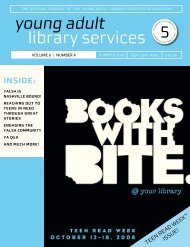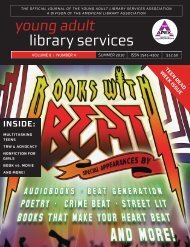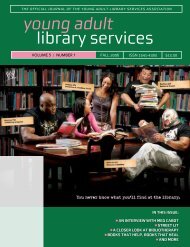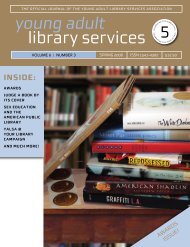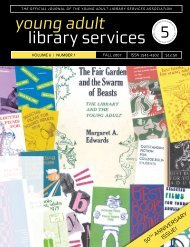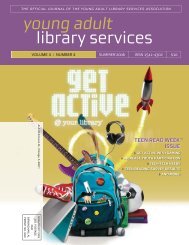Spring 2007 - YALSA - American Library Association
Spring 2007 - YALSA - American Library Association
Spring 2007 - YALSA - American Library Association
Create successful ePaper yourself
Turn your PDF publications into a flip-book with our unique Google optimized e-Paper software.
featureschool library <strong>YALSA</strong> perspectiveBeing able to recommend titles tostudents depends upon havinga collection that supports thoserecommendations. So, ultimately, it allstarts with selection. Selection can be avery subtle form of censorship, particularlyin schools, because it is so often fraughtwith fear of objection by teachers, principals,parents, or the school board. Takea moment, however, to think about thosebooks that are never purchased or that arepurchased and put on restricted shelves.How are you to recommend these titlesunder these conditions—especially if yourlibrary doesn’t own them? Most librariansand media specialists in schools wouldagree that censorship is bad while selectionis good. Censorship excludes and selectionincludes. But where do we draw the linebetween the two?Librarians have a professional responsibilityto develop and maintain wellroundedcollections. The <strong>Library</strong> Bill ofRights, the Freedom to Read Statement,and many other policies help guide usin the selection of materials. However, itbecomes very difficult for those on thefront lines to marry lofty principles withday-to-day decisions about inclusion orexclusion. How do we best inform studentsabout controversial issues? How dowe best help students deal with conflictingideals and all those “isms,” such aspatriotism, <strong>American</strong>ism, nationalism,family idealism, jingoism, internationalism,egalitarianism, anti-communism, pacifism,racism, sexism, humanitarianism, multiculturalism,revisionism, and so on?Librarians often have to deal withvocal people who make some strangeconnections. For instance, one unhappyAre WeSelecting?Or Are WeCensoring?mother who was concerned about contemporaryadolescent literature said thatchildren who read the classics are lesslikely to become pregnant. After hearingthis statement, Ken Donelson, an Englishprofessor at Arizona State University, saidhe was prompted to consider writing anarticle titled “The Classics as Condoms.”Donnelson went on to say that censors“continue to believe that the classics aresafe, non-controversial, non-dirty, dry,dusty, and dull. [They] will harm no one,because the authors are safely dead andtheir works difficult or impossible to read.That judgment would surprise Dickens,astound Hardy, and delight Twain.” 1Perhaps that is why they are so “safe”—noone reads them anymore.Ironically, we must all become censorsof ourselves. That is, we must be very vigilantwith respect to those elusive elementsCHRISTINE M. ALLEN is currently <strong>YALSA</strong>’s elected Councilor toALA’s Council and the District Librarian (K–12) for a large urbanSouthern California school district. She has also been a YouthServices Librarian in a public library and has taught elementaryand middle school students.By Christine M. Allenthat can predetermine our collection decisionswithout our conscious knowledge.We don’t ever want school libraries tofunction in the manner Barbara Hollanddescribed:Bear in mind that books, sponsored,provided or recommended bypublic schools may be on the blandside. . . .The school district’s firstconsideration has to be whether abook will offend anybody and thatmeans everybody from the ladies’auxiliary to the one macrobioticparent. The result is books chosenor specially edited that have all thetaste and texture of cold, boiledrice. 2 YALSReferences1. Ken Donelson, “Six Statements/Questionsfor the Censors,” Phi Delta Kappan 69, no.3 (1987): 208.2. Barbara Holland, “Opening the Door toReading,” Parents 65, no. 4 (1990): 77.<strong>Spring</strong> <strong>2007</strong> | Young Adult <strong>Library</strong> Services | YALS


